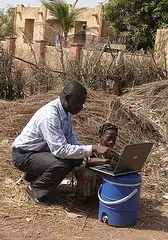10 lessons learnt from ICT4D
 Information and Communications Technologies for Development (ICT4D) is still a fairly new theme in the development arena. Throughout the years ICT4D has diversified in many different sub-themes such as e-governance, e-agriculture, e-health, education, etc. Although there have been successful stories, the high hopes had often not been realized in many projects. Many initiatives did not work out and so many projects failed to establish a solid and sustainable approach for ICT4D. The reasons are multifold and some learnt lessons are the following:
Information and Communications Technologies for Development (ICT4D) is still a fairly new theme in the development arena. Throughout the years ICT4D has diversified in many different sub-themes such as e-governance, e-agriculture, e-health, education, etc. Although there have been successful stories, the high hopes had often not been realized in many projects. Many initiatives did not work out and so many projects failed to establish a solid and sustainable approach for ICT4D. The reasons are multifold and some learnt lessons are the following:
- ICT4D has been and still is narrowly focused on infrastructure.
- Underestimation for the importance of training, qualification, and the different dimensions of connectivity.
- ICT4D can only successful if it is a mean and not the end itself.
- Many projects were not orientated on the needs. The benefit of ICT output remained often unclear.
- ICT4D projects were often not seen from a holistic perspective. Many projects lacked a sustainable concept.
- Just to offer information (e.g. websites or databases) leads to nothing when people do not see a benefit in it.
- ICT4D has social, cultural, political and economical dimensions. In that regard technology is only one part.
- Many experiments could have been avoided if previous experiences were considered (e.g. rural radios).
- ICT4D works most successfully when its users take over it, creating and changing technology to their needs.
- Lastly the ICT4D has only a fragmenting approach of sharing knowledge and learning experiences. Ironically, most ICT4D initiatives are not linked together - the potential of the web has not been bailed.
A major challenge, however, is the lack of proven impact for ICT in development. That's why the United Nations Conference on Trade and Development devoted, lately, an own website to this challenge. The business sector has achieved significantly more, as the success of mobile phones shows. The grameen phone campaign has proven its impact to tackle poverty; which computers, networks and the Internet did not achieve in a decade. A tragic example are telecentres or Internet cafes, which in Africa now often go bankrupt because people rather spend money on their mobile phones.
The market-driven mobile phone phenomenon stood out amidst many donor-driven ‘pilot’ projects that had either collapsed or never delivered the promise, says Nalaka Gunawardene therefore in a critical summary of the first years of ICT4D.
But is it that critical when the web shows every day what is possible, and how sheer connectedness has its impact on development? Many countries have achieved important steps such as India's approach to e-governance or Venezuela's results of switching to free and open source software. However, very decisive, from my point of view, will be web2.0, the social web, or the collaborative web. Why is that; I will answer on my next post.